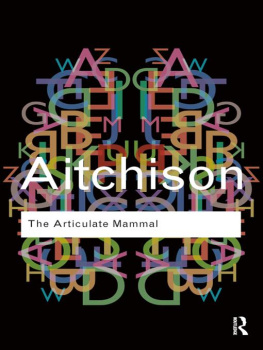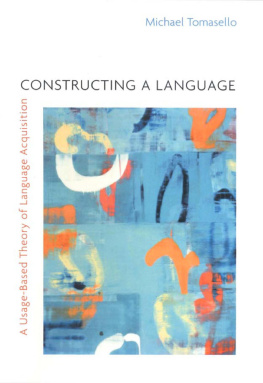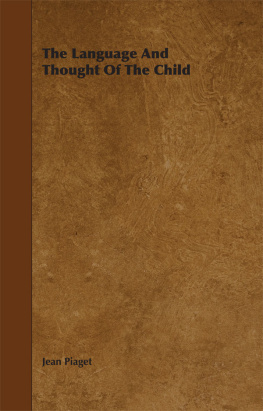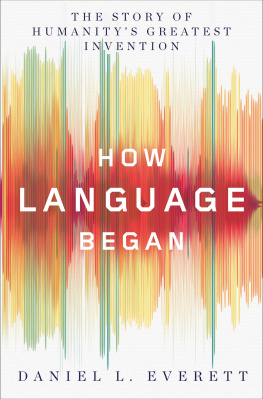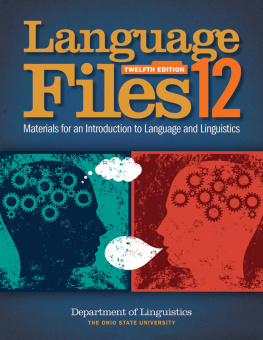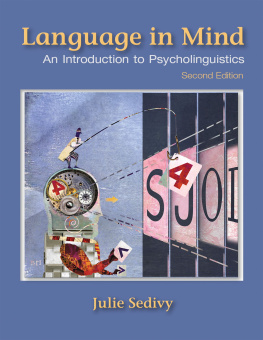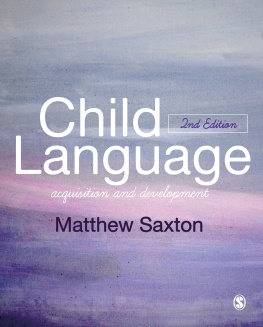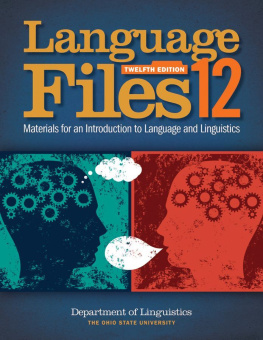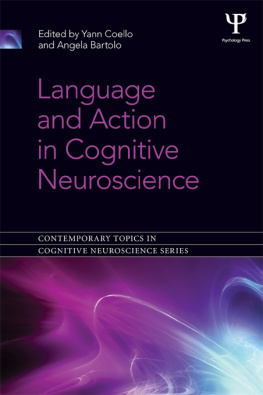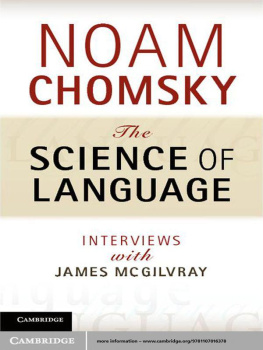
The Articulate Mammal
An excellent and very welcome guide to psycholinguistics... highly recommended.
The Washington Post
The readers curiosity about the complexities of the mother tongue is kept right to the end.
The Times Educational Supplement
This is an excellent text which would give the undergraduate student as fi ne an introduction to the fi eld of psycholinguistics as is available today.
Choice

Routledge Classics contains the very best of Routledge publishing over the past century or so, books that have, by popular consent, become established as classics in their field. Drawing on a fantastic heritage of innovative writing published by Routledge and its associated imprints, this series makes available in attractive, affordable form some of the most important works of modern times.
For a complete list of titles visit
www.routledge.com/classics
Jean
Aitchison
The Articulate Mammal
An introduction to psycholinguistics
With a foreword by the author

First published 1976 by the Academic Division of Unwin Hyman Ltd
First published by Routledge 2008
First published in Routledge Classics 2011
by Routledge
2 Park Square, Milton Park, Abingdon, Oxon OX14 4RN
Simultaneously published in the USA and Canada
by Routledge
711 Third Avenue , New York, NY 10017
Routledge is an imprint of the Taylor & Francis Group, an informa business
Jean Aitchison 1976, 1983, 1989, 1998, 2008
Foreword 2011 Jean Aitchison
The right of Jean Aitchison to be identifi ed as author of this work has been asserted by her in accordance with sections 77 and 78 of the Copyright, Designs and Patents Act 1988.
All rights reserved. No part of this book may be reprinted or reproduced or utilized in any form or by any electronic, mechanical, or other means, now known or hereafter invented, including photocopying and recording, or in any information storage or retrieval system, without permission in writing from the publishers.
Trademark notice : Product or corporate names may be trademarks or registered trademarks, and are used only for identifi cation and explanation without intent to infringe.
British Library Cataloguing in Publication Data
A catalogue record for this book is available from the British Library
Library of Congress Cataloging in Publication Data
Aitchison, Jean, 1938
The articulate mammal : an introduction to psycholinguistics / Jean,
Aitchison ; with a foreword by the author.Routledge classic ed.
p. cm.(Routledge Classics)
Includes bibliographical references and index.
ISBN 9780415610186 (pbk. : alk. paper)ISBN: 9780203828243
(e-book) 1. Psycholinguistics. I. Title.
P37.A37 2011
401.9dc22
2011003600
ISBN: 9780415610186 (pbk)
ISBN: 9780203828243 (ebk)
C ONTENTS
F OREWORD TO THE R OUTLEDGE C LASSICS E DITION
Psychology and linguistics are sometimes claimed to have been first connected in the writings of Wilhelm Wundt (18311920), a 19th century psychology pioneer. His linking of the topics predated the label psycholinguistics , which came later. It was still in its early days in the 1960s, when it became an increasingly popular topic in psychology textbooks.
The Articulate Mammal , when it was first published (1976), was possibly the first introduction to psycholinguistics written from the point of view of a linguist, that is, a professional scholar of linguistics, the science of language. Its aim was threefold: first, to spread information about the biological nature of language, and to outline current work on how children acquire language; second, to explain the ideas of Noam Chomsky to non-linguists; and third, to summarize recent ideas on speech comprehension and production. The book received a batch of encouraging reviews, especially in the USA, where an American library journal selected it as one of its outstanding academic books of the year.
The information about the biological nature of language was based on the pioneering work of the biologist Eric Lenneberg, who had written a lucid and inspirational account in his groundbreaking book Biological Foundations of Language (1967) . Lenneberg was possibly the first person to explain that language, much like walking or sexual behaviour, was biologically triggered. It was scheduled to emerge at a particular time in an individuals life, provided that the surrounding environment was normal, in that the child must hear language spoken around him/her. Lenneberg died unexpectedly in 1975, and I was pleased to be able to spread news of his work to a wider audience. (My book was already in press when Lennebergs death was announced). The Articulate Mammal therefore not only made Lennebergs ideas more widely known, but also (hopefully) kept his name and findings in the minds of future generations.
Lenneberg was prescient in ways he could never have imagined. In the years since his death, the biological aspects of language and the brain have come to the forefront in research, as outlined in the latest (5th) edition of The Articulate Mammal (2008). First, and most importantly, brain scans have become the norm. These can not only provide new information about language and the brain, but can also support (or disprove) linguistic hypotheses.
In the earliest brain scans, the data obtained were fairly general. Scans could, for example, show up the density of brain tissue, which might aid in identifying a tumour. Later scans (summarized in ) provide a three-dimensional image of blood flow in the brain, which can reveal brain activity. Early scans were invasive, in that they required radioactive water to be injected into a vein in the arm. The subjects were asked to perform progressively more complicated tasks. For example, researchers might ask subjects to listen to words at one time, at another time to read them, and the brain areas activated were recorded and compared. Then subjects were asked to supply a verb for any nouns they heard or saw: the noun hammer might elicit the verb hit , or the noun apple the verb eat . This research suggested again that linguistic and neurological studies could usefully support one another.
But the study that caused the greatest interest was one which investigated verbs, comparing brain activation for regular past tense formations (e.g. jumped) with irregular ones (e.g. sang ). The researchers found that irregular past tenses elicited a significantly greater amount of brain activity than the regular past tenses. This finding was no surprise to linguists, who had long ago concluded that past tenses of regular verbs are formed by the application of rules, but that irregular past tenses involve lexical memory. The importance of this finding was that it showed yet again that linguistic assumptions could now be checked by neurologists.
These days, brain scans are non-invasive and have become increasingly sophisticated. Functional magnetic resonance imaging (fMRI) is now widespread. The patient is placed in a scanner, and a painless (though noisy) procedure produces 3-D images of blood and oxygen in the brain. The main drawback (at the present time) is that these scans provide almost too much data, and researchers are still struggling to isolate the most relevant.
Next page
